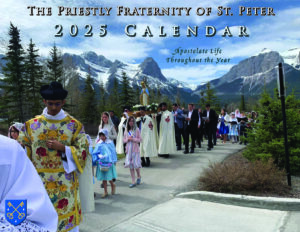Daily Epiphanies
There had been some inquiry as to the “mystery spiritual writer” quoted in our two previous posts. His name was intentionally absented as a teaser of sorts for the purpose of providing a longer quote today that should serve well to complete the trilogy for this Epiphany season. The following is from the third chapter of the book In the Likeness of Christ by Fr. Edward Leen (1885-1944).
There are daily Epiphanies in our lives. The grace of God is ever pointing out where the Child is. And we look at the outward circumstances, the mean disguises, the, to us, unworthy surroundings; we decide that God cannot be there where the star stands, and so we pass on and miss the Manifestation.
 God is always wrapped in the same garments in which He was enveloped at His coming into the world and in His passage through it. To us He always presents Himself in what thwarts the concupiscences of the flesh, in what contradicts our self-will, in what wounds our self-love, in a word, in pains, and trials, and disappointments, in sorrow, in opposition, and in failure.
God is always wrapped in the same garments in which He was enveloped at His coming into the world and in His passage through it. To us He always presents Himself in what thwarts the concupiscences of the flesh, in what contradicts our self-will, in what wounds our self-love, in a word, in pains, and trials, and disappointments, in sorrow, in opposition, and in failure.
He expects us, as He expected the kings, to recognize Him under these habiliments.
Every cross in our life is, as it were, a reliquary containing God. If we embrace it with faith it will open and reveal His Presence to us. When too much influenced, too much governed, too much determined by human external appearances, we decide that surely God could not and would not take such a form for His Manifestation, we fail in faith, we have not the docility and the simplicity of the Magi. It is for God, not for us, to determine the mode in which He offers Himself to each human soul for worship and for fealty – worship as to its God, fealty as to its King.
 Jesus comes to us in everything that tends to mortify our self-love and our pride, in everything that tends to break down the obstacles that prevent the development of the interior life, our growth in the vision and love of God. He manifests Himself to the religious-minded in the uncongenial task, the irritating opposition, and in the uncouth companion – in all the multiple disabilities, annoyances, and inconveniences arising for us from the failure or the imperfection of creatures.
Jesus comes to us in everything that tends to mortify our self-love and our pride, in everything that tends to break down the obstacles that prevent the development of the interior life, our growth in the vision and love of God. He manifests Himself to the religious-minded in the uncongenial task, the irritating opposition, and in the uncouth companion – in all the multiple disabilities, annoyances, and inconveniences arising for us from the failure or the imperfection of creatures.
But at every conjuncture God wishes us to discover Himself, however disconcerting be the guise in which He comes.
 It is not easy – it requires strong faith in the long, dull sequence of squalid, obscure, and pointless miseries that condition our daily lot. In the dullness and weakness of our faith, we pause disconcerted before the humble appearance; we decide that God is not there and pass on our way.
It is not easy – it requires strong faith in the long, dull sequence of squalid, obscure, and pointless miseries that condition our daily lot. In the dullness and weakness of our faith, we pause disconcerted before the humble appearance; we decide that God is not there and pass on our way.
We are always looking for Him elsewhere, in different circumstances, in other surroundings, and in more gracious conditions.
When men, moved by grace, turn from the ordinary routine life and resolve to give themselves wholly to God, they are prone to judge that all difficulties are overcome after the initial act of surrender to the will of God and renouncement of creatures has been made. They think that henceforth life will be a smooth, tranquil development of the life of grace in their souls. And they expect God so to arrange life that no harsh and distracting conditions will intervene to complicate and disturb the soul’s quiet converse with Himself.
The incident of the Magi teaches that hardship, anxiety, pain and harsh circumstances must always prepare the way for the discovery of the Child in its Mother’s arms.
We do not find the herald of God or God Himself in easy circumstances. The Child of Mary, many years later, warned His hearers of this, saying: But what went you out to see? A man in soft garments? Behold they that are clothed in soft garments are in the houses of kings (Mt. 11:8).
January 11, 2021








